
Question Number 76126 by Master last updated on 24/Dec/19
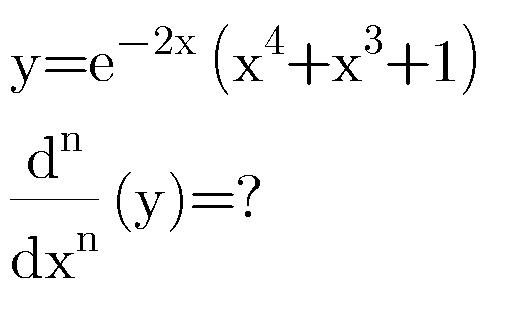
Commented by benjo last updated on 24/Dec/19
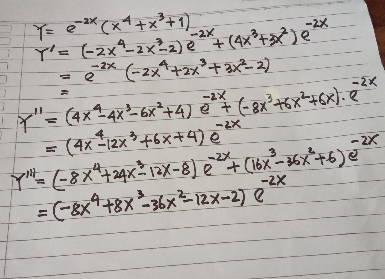
Commented by benjo last updated on 24/Dec/19

$$\mathrm{i}\:\mathrm{cannot}\:\mathrm{find}\:\mathrm{formula}\:\mathrm{the}\:\mathrm{simple}\:\mathrm{form}\:\mathrm{n}−\:\mathrm{th} \\ $$$$\mathrm{derivative} \\ $$
Commented by Master last updated on 24/Dec/19

$$\mathrm{Mr}.\:\mathrm{n}\:\mathrm{degree}\:\mathrm{output}\:\mathrm{is}\:\mathrm{required}.\:\mathrm{thank}\:\mathrm{you} \\ $$
Commented by MJS last updated on 24/Dec/19
![(d/dx)[y=e^(αx) (ax^4 +bx^3 +cx^2 +dx+e)]= =e^(αx) (aαx^4 +(4a+bα)x^3 +(3b+cα)x^2 +(2c+dα)x+d+eα) it′s possible to find formulas for the constant factors, sorry I have no time right now](Q76133.png)
$$\frac{{d}}{{dx}}\left[{y}=\mathrm{e}^{\alpha{x}} \left({ax}^{\mathrm{4}} +{bx}^{\mathrm{3}} +{cx}^{\mathrm{2}} +{dx}+{e}\right)\right]= \\ $$$$=\mathrm{e}^{\alpha{x}} \left({a}\alpha{x}^{\mathrm{4}} +\left(\mathrm{4}{a}+{b}\alpha\right){x}^{\mathrm{3}} +\left(\mathrm{3}{b}+{c}\alpha\right){x}^{\mathrm{2}} +\left(\mathrm{2}{c}+{d}\alpha\right){x}+{d}+{e}\alpha\right) \\ $$$$\mathrm{it}'\mathrm{s}\:\mathrm{possible}\:\mathrm{to}\:\mathrm{find}\:\mathrm{formulas}\:\mathrm{for}\:\mathrm{the}\:\mathrm{constant} \\ $$$$\mathrm{factors},\:\mathrm{sorry}\:\mathrm{I}\:\mathrm{have}\:\mathrm{no}\:\mathrm{time}\:\mathrm{right}\:\mathrm{now} \\ $$
Commented by john santuy last updated on 24/Dec/19
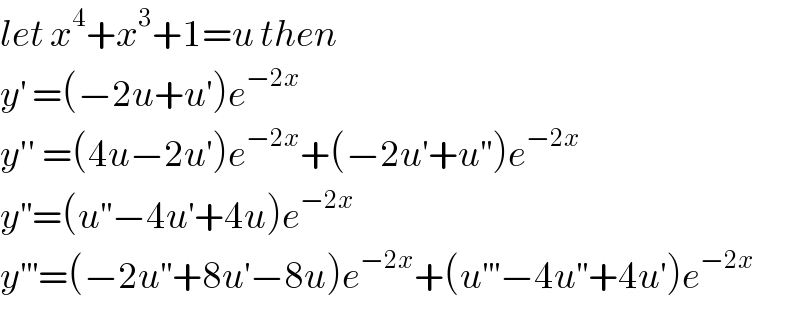
$${let}\:{x}^{\mathrm{4}} +{x}^{\mathrm{3}} +\mathrm{1}={u}\:{then}\: \\ $$$${y}^{'} \:=\left(−\mathrm{2}{u}+{u}^{'} \right){e}^{−\mathrm{2}{x}} \\ $$$${y}''\:=\left(\mathrm{4}{u}−\mathrm{2}{u}^{'} \right){e}^{−\mathrm{2}{x}} +\left(−\mathrm{2}{u}^{'} +{u}^{''} \right){e}^{−\mathrm{2}{x}} \\ $$$${y}^{''} =\left({u}^{''} −\mathrm{4}{u}^{'} +\mathrm{4}{u}\right){e}^{−\mathrm{2}{x}} \\ $$$${y}^{'''} =\left(−\mathrm{2}{u}^{''} +\mathrm{8}{u}^{'} −\mathrm{8}{u}\right){e}^{−\mathrm{2}{x}} +\left({u}^{'''} −\mathrm{4}{u}^{''} +\mathrm{4}{u}^{'} \right){e}^{−\mathrm{2}{x}} \\ $$
Commented by john santuy last updated on 24/Dec/19

$${may}\:{be}\:{sir}\:{can}\:{the}\:{formulas}\:{n}−{th}\:{derivative} \\ $$
Commented by mathmax by abdo last updated on 24/Dec/19
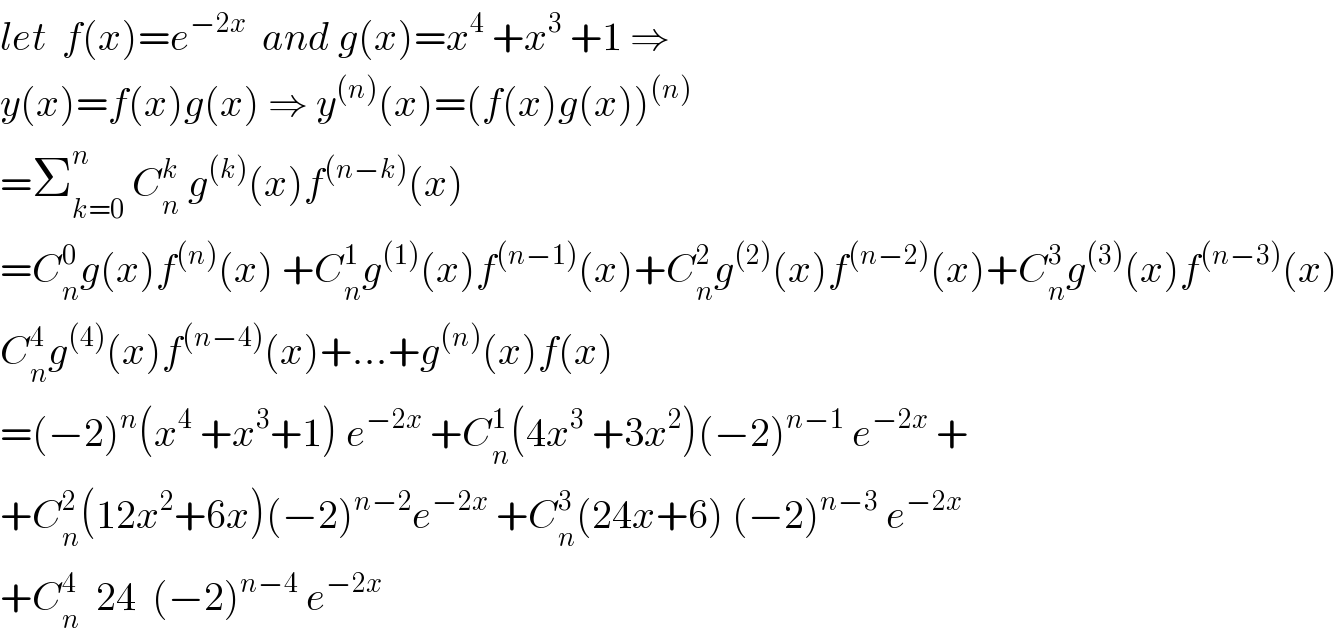
$${let}\:\:{f}\left({x}\right)={e}^{−\mathrm{2}{x}} \:\:{and}\:{g}\left({x}\right)={x}^{\mathrm{4}} \:+{x}^{\mathrm{3}} \:+\mathrm{1}\:\Rightarrow \\ $$$${y}\left({x}\right)={f}\left({x}\right){g}\left({x}\right)\:\Rightarrow\:{y}^{\left({n}\right)} \left({x}\right)=\left({f}\left({x}\right){g}\left({x}\right)\right)^{\left({n}\right)} \\ $$$$=\sum_{{k}=\mathrm{0}} ^{{n}} \:{C}_{{n}} ^{{k}} \:{g}^{\left({k}\right)} \left({x}\right){f}^{\left({n}−{k}\right)} \left({x}\right) \\ $$$$={C}_{{n}} ^{\mathrm{0}} {g}\left({x}\right){f}^{\left({n}\right)} \left({x}\right)\:+{C}_{{n}} ^{\mathrm{1}} {g}^{\left(\mathrm{1}\right)} \left({x}\right){f}^{\left({n}−\mathrm{1}\right)} \left({x}\right)+{C}_{{n}} ^{\mathrm{2}} {g}^{\left(\mathrm{2}\right)} \left({x}\right){f}^{\left({n}−\mathrm{2}\right)} \left({x}\right)+{C}_{{n}} ^{\mathrm{3}} {g}^{\left(\mathrm{3}\right)} \left({x}\right){f}^{\left({n}−\mathrm{3}\right)} \left({x}\right) \\ $$$${C}_{{n}} ^{\mathrm{4}} {g}^{\left(\mathrm{4}\right)} \left({x}\right){f}^{\left({n}−\mathrm{4}\right)} \left({x}\right)+...+{g}^{\left({n}\right)} \left({x}\right){f}\left({x}\right) \\ $$$$=\left(−\mathrm{2}\right)^{{n}} \left({x}^{\mathrm{4}} \:+{x}^{\mathrm{3}} +\mathrm{1}\right)\:{e}^{−\mathrm{2}{x}} \:+{C}_{{n}} ^{\mathrm{1}} \left(\mathrm{4}{x}^{\mathrm{3}} \:+\mathrm{3}{x}^{\mathrm{2}} \right)\left(−\mathrm{2}\right)^{{n}−\mathrm{1}} \:{e}^{−\mathrm{2}{x}} \:+ \\ $$$$+{C}_{{n}} ^{\mathrm{2}} \left(\mathrm{12}{x}^{\mathrm{2}} +\mathrm{6}{x}\right)\left(−\mathrm{2}\right)^{{n}−\mathrm{2}} {e}^{−\mathrm{2}{x}} \:+{C}_{{n}} ^{\mathrm{3}} \left(\mathrm{24}{x}+\mathrm{6}\right)\:\left(−\mathrm{2}\right)^{{n}−\mathrm{3}} \:{e}^{−\mathrm{2}{x}} \\ $$$$+{C}_{{n}} ^{\mathrm{4}} \:\:\mathrm{24}\:\:\left(−\mathrm{2}\right)^{{n}−\mathrm{4}} \:{e}^{−\mathrm{2}{x}} \\ $$
Commented by Master last updated on 24/Dec/19

$$\mathrm{thank}\:\mathrm{you}\:\mathrm{sir} \\ $$
Commented by turbo msup by abdo last updated on 24/Dec/19

$${you}\:{are}\:{welcome}. \\ $$
Answered by mr W last updated on 24/Dec/19
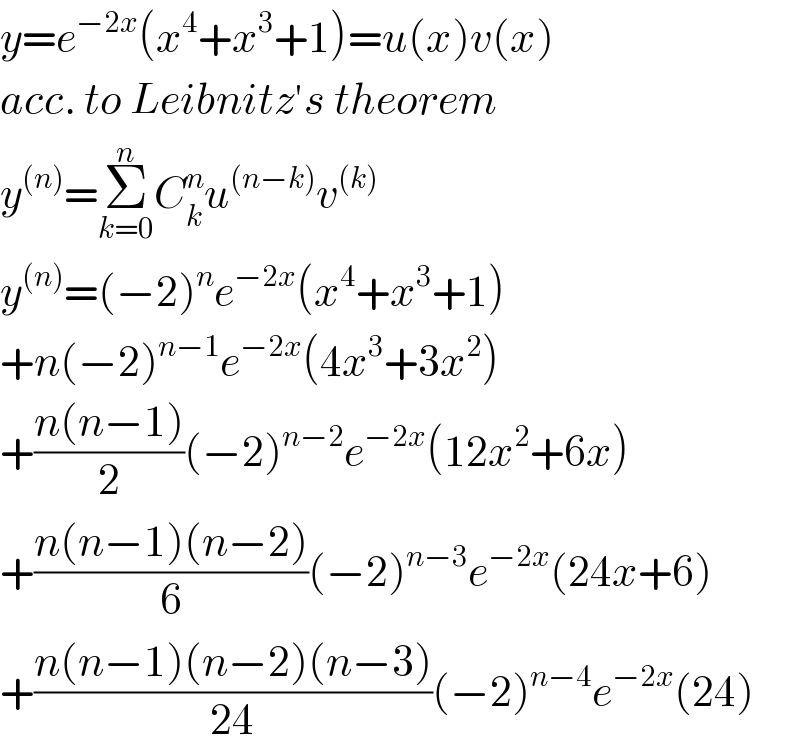
$${y}={e}^{−\mathrm{2}{x}} \left({x}^{\mathrm{4}} +{x}^{\mathrm{3}} +\mathrm{1}\right)={u}\left({x}\right){v}\left({x}\right) \\ $$$${acc}.\:{to}\:{Leibnitz}'{s}\:{theorem} \\ $$$${y}^{\left({n}\right)} =\underset{{k}=\mathrm{0}} {\overset{{n}} {\sum}}{C}_{{k}} ^{{n}} {u}^{\left({n}−{k}\right)} {v}^{\left({k}\right)} \\ $$$${y}^{\left({n}\right)} =\left(−\mathrm{2}\right)^{{n}} {e}^{−\mathrm{2}{x}} \left({x}^{\mathrm{4}} +{x}^{\mathrm{3}} +\mathrm{1}\right) \\ $$$$+{n}\left(−\mathrm{2}\right)^{{n}−\mathrm{1}} {e}^{−\mathrm{2}{x}} \left(\mathrm{4}{x}^{\mathrm{3}} +\mathrm{3}{x}^{\mathrm{2}} \right) \\ $$$$+\frac{{n}\left({n}−\mathrm{1}\right)}{\mathrm{2}}\left(−\mathrm{2}\right)^{{n}−\mathrm{2}} {e}^{−\mathrm{2}{x}} \left(\mathrm{12}{x}^{\mathrm{2}} +\mathrm{6}{x}\right) \\ $$$$+\frac{{n}\left({n}−\mathrm{1}\right)\left({n}−\mathrm{2}\right)}{\mathrm{6}}\left(−\mathrm{2}\right)^{{n}−\mathrm{3}} {e}^{−\mathrm{2}{x}} \left(\mathrm{24}{x}+\mathrm{6}\right) \\ $$$$+\frac{{n}\left({n}−\mathrm{1}\right)\left({n}−\mathrm{2}\right)\left({n}−\mathrm{3}\right)}{\mathrm{24}}\left(−\mathrm{2}\right)^{{n}−\mathrm{4}} {e}^{−\mathrm{2}{x}} \left(\mathrm{24}\right) \\ $$
Commented by Master last updated on 24/Dec/19

$$\mathrm{thanks}\:\:\mathrm{sir} \\ $$
